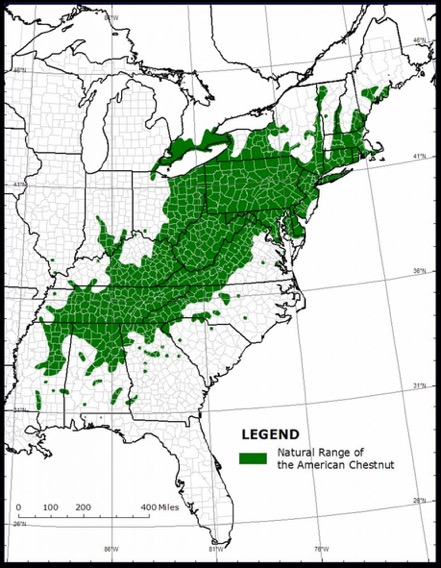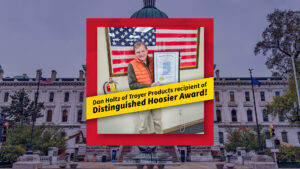More than a century ago, nearly four billion American chestnut trees were growing in the eastern U.S. They were among the largest, tallest, and fastest-growing trees. The wood was rot-resistant, straight-grained, and suitable for furniture, fencing, and building. The nuts fed billions of wildlife, people and their livestock. It was almost a perfect tree, that is until a blight fungus killed it more than a century ago. The chestnut blight has been called the greatest ecological disaster to strike the world’s forests in all of history.
“The American chestnut tree survived all adversaries for 40 million years, then disappeared within 40.”
This is the sad introduction within the website of The American Chestnut Foundation. The American Chestnut is not extinct — yet. The blight usually does not damage the affected trees’ root structure. The tree sends up sprouts from the stump in its desperate attempt to survive, that grow for a while and die back down, rendering this once-mighty and useful tree a sickly bush.
Bringing Them Back
 TACF’s mission is to restore the American Chestnut tree through a breeding, biotechnology, and biocontrol strategy, involving: breeding the trees involving blight-resistant hybrids, using genetic strategies to increase the blight resistance of the trees, and finding biologic agents to attack the blight fungus to render it less lethal to the trees. The breeding strategy is to add the blight-resistant property of the Chinese Chestnut tree, through hybridization. Then the most blight-resistant progeny are selected for further breeding. Through successive generations, the tree will possess a predominantly American chestnut genome, except for the blight-resistant Chinese genetic component. Various plantings of these trees are managed by the Chestnut Foundation and test plantings have begun, reintroducing the trees into their native habitat.
TACF’s mission is to restore the American Chestnut tree through a breeding, biotechnology, and biocontrol strategy, involving: breeding the trees involving blight-resistant hybrids, using genetic strategies to increase the blight resistance of the trees, and finding biologic agents to attack the blight fungus to render it less lethal to the trees. The breeding strategy is to add the blight-resistant property of the Chinese Chestnut tree, through hybridization. Then the most blight-resistant progeny are selected for further breeding. Through successive generations, the tree will possess a predominantly American chestnut genome, except for the blight-resistant Chinese genetic component. Various plantings of these trees are managed by the Chestnut Foundation and test plantings have begun, reintroducing the trees into their native habitat.
Some of the Western-most test groves are located near Troyer Products’ facility in Northern Indiana. Indiana’s Purdue University is also working on reestablishing the American Chestnut in our forests.
Supporting the Cause
Troyer Products proudly supports The American Chestnut Foundation. Regenerated stands of native trees are a net benefit for American life, especially adding to the plant diversity and economy of rural Appalachian communities, and the wider ecological health of the United States.
To learn more about this project, visit the American Chestnut Foundation website.
To read more about the American Chestnut, click here to read an article from Purdue University.




